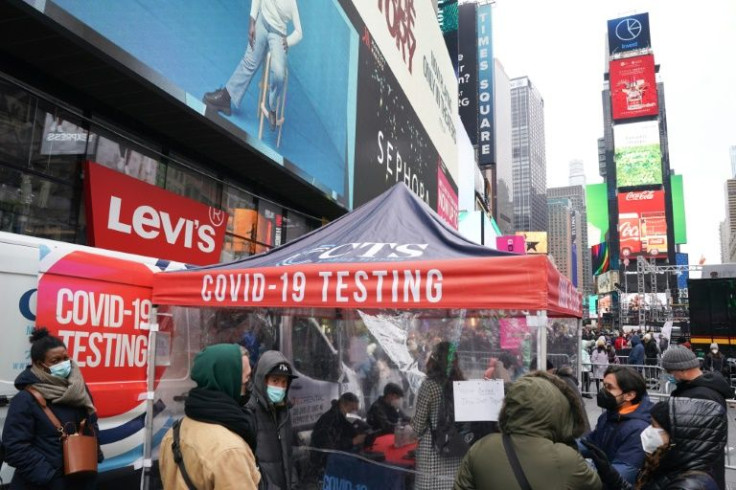US Hits New Record For Daily Covid Cases Amid Testing Woes
The United States has hit its highest-ever average of new Covid cases as the Omicron variant spreads at a blistering pace, amid testing woes and health worker shortages.
The moving seven-day average of new cases was 265,427 as of Tuesday, surpassing the previous peak of 251,989 set in mid-January 2021, a tracker maintained by the university showed.
Ahead of Johns Hopkins releasing the data, Harvard epidemiologist and immunologist Michael Mina tweeted the count was likely the "tip of the iceberg" with the true number of cases likely far higher, because of a shortage of tests and results from home tests not being included.
The heavily-mutated Omicron strain, which according to government modeling accounted for around 59 percent of national US cases in the week ending December 25, is the most transmissible seen to date.
It is frequently able to bypass prior immunity conferred by vaccination and prior infection.
Though the rate of severe outcomes appears to be lower, Omicron is already stretching previously strained hospital systems throughout the country, with health workers leaving in droves because of burnout.
Hospital systems are turning to "travel nurses" on lucrative short term contracts to overcome shortages.
The Des Moines Register reported the state of Iowa was paying a company to supply nurses who would be expected to work 20 hours overtime at a rate of $330 an hour.
Nationwide, almost 9,000 Covid patients are being admitted every day, according to data collected by the Centers for Disease Control and Prevention (CDC), still some way short of the peak of 16,500 per day seen in January, though this is a lagging indicator.
Around 1,200 people were dying on average every day on December 23, the day before data collection was disrupted by Christmas holidays.
In January, deaths peaked at an average of 3,400 a day.

The crisis is increasingly a political liability for President Joe Biden, who as a candidate slammed his predecessor Donald Trump for his failure to manage the pandemic and promised to perform far better.
Amid the worrying news, America was also looking to tentative signs of hope from countries further along their Omicron waves.
Experts are hoping that the country's experience will be more like a "flash flood" as seen in South Africa, where it was first reported in mid-November but where cases have been receding since more than a week.
In Britain, where cases have also skyrocketed, new Covid deaths have so far remained flat.
More than 820,000 Americans have died from Covid, making the United States by far the hardest-hit country in the world, ahead of Brazil and of India.
By October, the latest month for which data has been analyzed, unvaccinated people had a five times greater chance of being infected with Covid, and 14 times higher chance of dying, compared to vaccinated people.
Though that data does not account for Omicron, accumulating research shows that vaccination and boosting continue to protect well against severe outcomes.
The latest milestone comes as the CDC shortened recommended times that people should isolate after a positive test from 10 to five days, so long as they do not have symptoms and continue to wear a mask.
The move was praised by airlines and the hospitality industry, but public health experts criticized the decision to omit a requirement for a negative Covid test -- even via rapid antigen, which correlates well with infectiousness.
© Copyright AFP {{Year}}. All rights reserved.





















